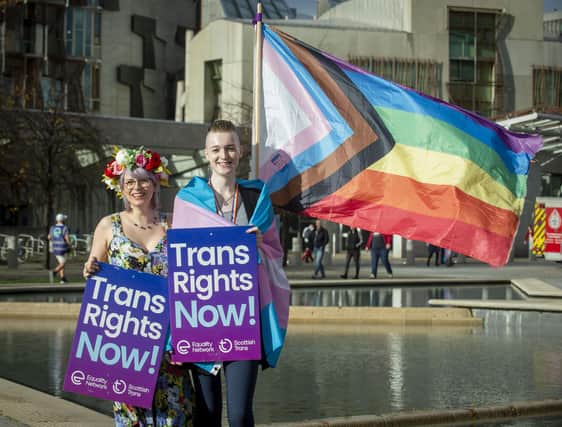Euan McColm: Trans activist's 'punishment' makes mockery of Police Scotland's 'priority' to protect women from violence


When Police Scotland announced earlier this year that violence against women and girls was one of their priorities, you may have thought they meant tackling it.
Perhaps, as I did, you imagined the national force would be taking forward a strict zero-tolerance approach to attacks on female victims. Maybe you assumed cops would use their powers to their fullest extent in holding male perpetrators accountable.
Advertisement
Hide AdAdvertisement
Hide AdNow, one could be excused for believing the national force’s priority is to excuse or even ignore incidents where men assault women.
Right now, Police Scotland’s commitment to justice for female victims looks questionable, at best.
Last Sunday, feminists concerned that plans to reform the Gender Recognition Act will allow male-bodied people to gain access to legally protected female-only spaces, gathered to demonstrate in Aberdeen’s Duthie Park. As is inevitable, a counter-protest by trans rights activists was organised.
Equally inevitably, some of those counter-protestors were abusive and threatening to the women who’d gathered in the park (if footage exists of a trans rights protest during which women with concerns about the protection of same-sex spaces were not abused and threatened, I’m yet to see it).
Threats and abuse are one thing (that’s not to say they’re not serious criminal matters) but physical assault is quite another. Last weekend in Aberdeen, one man crossed that line. Julie Marshall, a 54-year-old feminist, was punched in the head and arm by a 26-year-old man. This incident was witnessed and the assailant quickly identified to police on the scene.
Here was a moment when officers should have lived up to their commitment to protecting women.
They failed. Marshall’s attacker was not arrested and charged. Instead, he received a recorded police warning.
This meaningless sanction will vanish from records in two years and won’t automatically be revealed during any routine background checks. Notwithstanding the inconvenience to the perpetrator of having to speak to officers, one might reasonably say he got off Scot-free.
Advertisement
Hide AdAdvertisement
Hide AdA week after the incident, pressure on the national force is mounting. Women’s rights campaigners want to know why officers did not arrest and charge the man in question.
The answer to that should matter to all of us.
At the heart of this particular issue are two questions. The first is perfectly straightforward: why wasn’t a man who assaulted a woman arrested and charged? The second is (only slightly) more complex: has Police Scotland failed in its duty to uphold an individual’s rights to free expression and freedom of assembly?
The policy analysis collective Murray Blackburn Mackenzie has, helpfully, raised this question with Iain Livingstone, Chief Constable of Police Scotland.
In a letter to Livingstone, MBM suggest that how seriously police take assaults on women meeting to express lawfully held beliefs impacts on whether they can safely exercise rights provided by the European Convention on Human Rights and protected by the Human Rights Act of 1998.
Furthermore, MBM would like to know how, precisely, giving a warning to a man seen assaulting a woman aligns with the violence against women and girls (VAWG) strategy launched in March.
A Police Scotland spokesman has said the force acted “in line with the Lord Advocate’s guidelines”. We shall have to take the Police’s word for that because those guidelines have not been made public.
The encouragement of violence against women is part and parcel of pro-Trans protests, where calls to punch, even kill, TERFs (trans exclusionary radical feminists) are commonplace.
Those demanding women opposed to reform of the Gender Recognition Act be silenced by any means necessary may believe they have right on their side, that they are doughty defenders of an oppressed minority, but nothing can justify violence against someone on the basis that one disagrees with their protected beliefs.
Advertisement
Hide AdAdvertisement
Hide AdFor too long, senior politicians have failed to provide real leadership on this issue. Several MPs and MSPs have made it abundantly clear that they believe the concerns of feminist campaigners to be irrelevant or, even hateful. Others have said nothing, fearful that defending these women might open them to the entirely specious charge that they are bigots.
Police forces and other institutions across the UK have been equally weak on the subject, preferring to parrot the “trans women are women” mantra than to examine whether, actually, there is a serious conflict between the protection of single-sex spaces and proposals to make it easier for people to change their gender in the eyes of the law.
The tide, I think, is beginning to turn. The Labour Party – at a UK level – has changed its position, recently announcing that it is no longer in favour of self-ID (the party in Scotland remains committed to this policy).
As politicians catch up with voters – the majority of whom oppose reform of the GRA that would allow male-bodied people into single-sex spaces – Trans Rights Activists will surely find their ability to intimidate and attack those with whom they disagree with impunity is much curtailed.
It is in everyone’s interest that this happens.
Regardless of one’s view of reform of the law surrounding the recognition of gender, the right to express that view without being assaulted is fundamental.
Had a 54-year-old woman attacked a 26-year-old man last weekend on the grounds that she disagreed with his support for reform of the GRA, trans rights activists would – quite rightly – have demanded police take the strongest possible action.
Police Scotland’s failure to arrest and charge Julie Marshall’s attacker should concern anyone who believes in freedom of expression and women's safety, regardless of their views on trans rights or, indeed, any other subject.